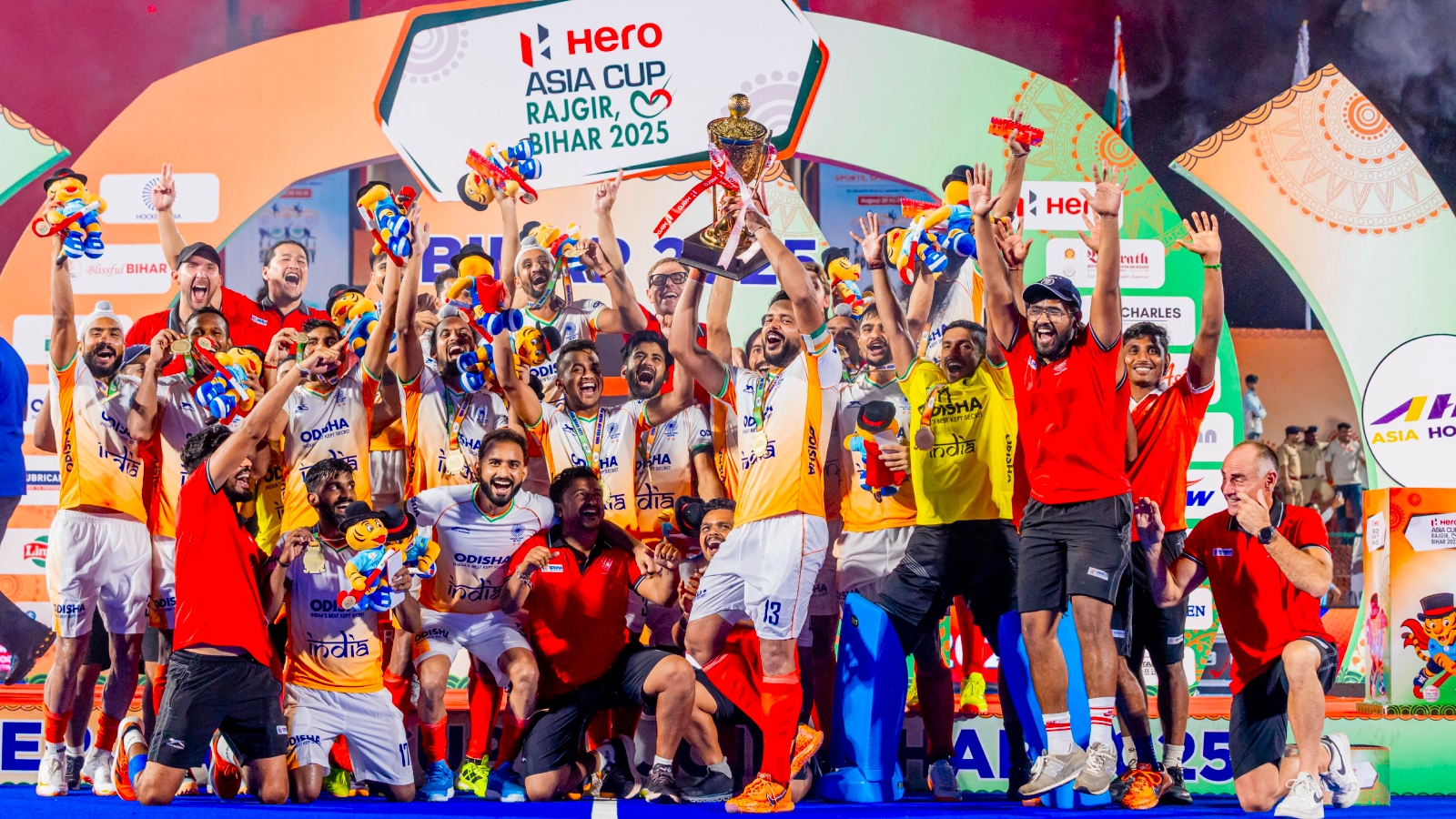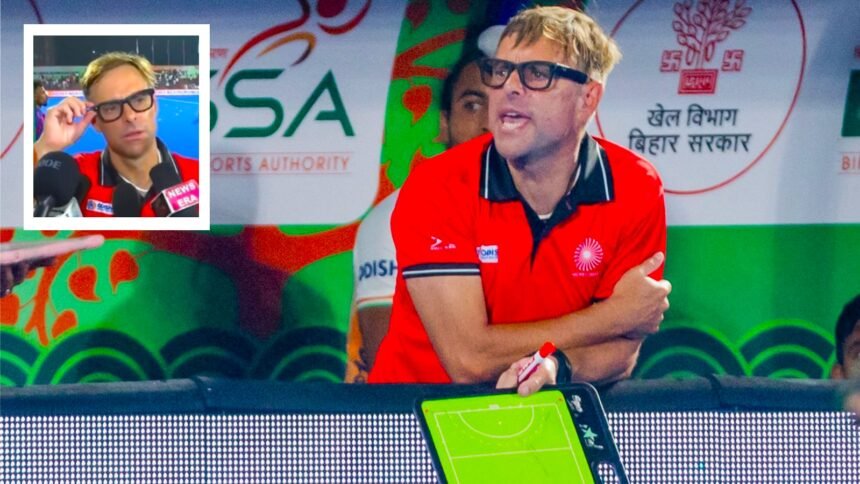As he trudged back to the dressing room during the half-time break, Craig Fulton took off his glasses, wiped them gently and casually flipped them back onto his face. The India coach wasn’t doing it for the trailing cameras. The meta glasses are his coaching equipment.
On the corner of the bold, classic square frame are cameras, which Fulton turns on when he begins his debriefing, recording the spoken words.
“Coaching is difficult, you can actually get emotionally caught up in the moment. And sometimes it’s good to reflect or listen to, was it clear, was it… And that’s why I use it,” he tells The Indian Express. “It’s just a straight camera. I just watch them (the video recordings) afterwards. Team talks, half-time team talks, two minutes, quarter time, individual conversations… I could go 70 minutes and I don’t know what I’ve said, I can’t remember everything I’ve said, all the conversations. So, that’s good.”
#WATCH | Rajgir, Bihar | Hockey Asia Cup 2025: India beat defending champion South Korea 4-1 in the final to lift the trophy after 8 years
Indian Men’s Hockey Coach Craig Fulton says, “…Super proud of the boys. We controlled the play better, and we were a bit more patient. We… pic.twitter.com/1fIkqFQ8tr
— ANI (@ANI) September 7, 2025
https://platform.twitter.com/widgets.js
It’s a peek into the approach of a coach who is leaving nothing to chance. And a fascinating nugget into the level of details Fulton and his staff have gone into as they turn a bunch of players who frequently suffered stage frights into a proper tournament team.
Sunday’s Asia Cup triumph was India’s fourth straight podium finish in a big tournament since Fulton took over two years ago, going back to the Asian Games in 2023, and the Paris Olympics and Asian Champions Trophy last year.
This isn’t a team that’s obsessed with winning it all. The Pro League and a string of bilateral test matches between the majors have been used to test combinations, try different structures and give the players breathing space where they can make mistakes and learn from them rather than being punished for it.
When the time comes, they raise their game; showing tactical flexibility that’s fast becoming the hallmark of this team — short, simple passing against Malaysia; an aerial game to spank China and high-press to counter South Korea.
Story continues below this ad
The Asia Cup title confirmed India’s regional dominance — they are the only team to hold all continental titles at the same time. But more has to be done to make sure India aren’t merely lions in their own den. Against the physically imposing and ruthless Europeans and Australia, India’s forwards won’t be afforded the same kind of space and time inside the shooting circle as they were by their Asian rivals.
Fulton knows. Even before his players, led by captain Harmanpreet Singh, lifted the trophy, Fulton’s thoughts had drifted to the other continent(s) that dictate the world hockey order.
 India hockey team celebrate winning the Asia Cup after defeating Korea in the final. (Hockey India)
India hockey team celebrate winning the Asia Cup after defeating Korea in the final. (Hockey India)
“There’s two different types of hockey. There’s Asian hockey and then there’s European hockey. So, all the power sits in Europe, in a way, and obviously Australia,” he says. “We’re trying to build something here (so) that we can have depth and then go and challenge the other teams in Europe. That’s the honesty, that’s what we’re trying to do.”
In other words, what India do in Asia and how they play does not have any bearing on their prospects when they face tougher challenges at next year’s World Cup. Fulton’s endeavour is to continue the dominance at continental level while also maintaining their level against the European sides and Australia.
Story continues below this ad
Fulton hailed his ‘super-intelligent’ players who could do ‘whatever we throw at them’. But it wasn’t smooth sailing from start to finish.
Through the last week, Hockey India’s top brass has given enough indication that the long-overdue phasing out process could be hastened. This, they explained, is to give the young players a long enough runway heading into the Los Angeles Olympics, ensure complacency doesn’t set in and keep the playing group fresh.
It appeared that the pressure of retaining their place in the squad led to moments when the players went solo, trying to do too much themselves. To Fulton’s credit, he managed to get the players to play selflessly in the matches that mattered. And to their credit, the players, too, ensured they did not waver from the end goal even though for some, the days in the national team could be numbered.
At some level, the transition has already begun. Two attackers from the Paris Olympics team, Gurjant Singh and Samsher Singh, have been pushed to the fringes, allowing the likes of Shilanand Lakra and Rajinder Singh to cement their spots. The two-time Olympic bronze medallist Lalit Upadhyay hung his boots after the Pro League campaign.
Story continues below this ad
It is learnt that the phasing out process could have happened much sooner. However, with the Junior World Cup just two months away, the team management decided to keep PR Sreejesh’s group intact for the time being.
Without naming anyone, selection committee chief RP Singh said the selection committee will have some ‘difficult conversations’ with some senior players in the coming days. Hockey India president Dilip Tirkey, on the other hand, added the performances of ‘all players has been closely monitored through the Pro League and Asian Games.’
“In the next two-three months, we will analyse the situation and see that the changes take place smoothly. I have a belief in the decisions the selectors make and the evaluation of the coach. Finally, he has to make them play,” Tirkey said.
Fulton was asked if he expected changes in the core group. “We’ll see. It all depends on… We have Azlan Shah, South Africa, Hockey India League, Pro League. We have the World Cup and the Asian Games three weeks apart, (so) it’s (about) building that depth,” said the man who carefully watches his words, quite literally.








